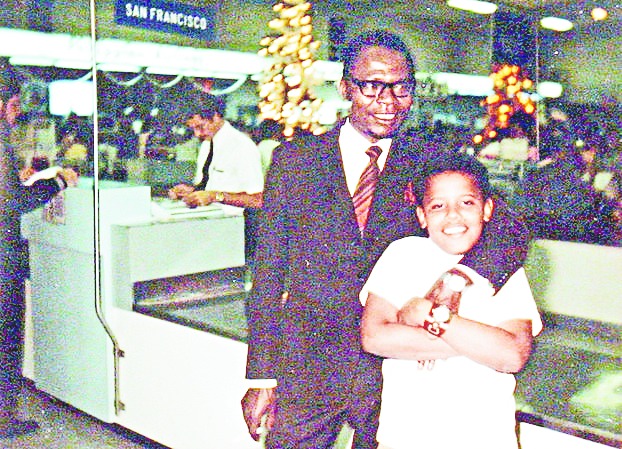
June 18: The archivist stumbled across the file in a stack of boxes on the second floor of the Schomburg Center for Research in Black Culture in Harlem. The yellowing letters inside dated back more than half a century, chronicling the dreams and struggles of a young man in Kenya.
He was ambitious and impetuous, a 22-year-old clerk who could type 75 words a minute and translate English into Swahili. But he had no money for college. So he pounded away on a typewriter in Nairobi, pleading for financial aid from universities and foundations across the Atlantic.
His letters would help change the course of American history.
"It has been my long cherished ambition to further my studies in America," he wrote in 1958. His name was Barack Hussein Obama, and his dispatches helped unleash a stream of scholarship money that carried him from Kenya to the US. There, he fathered the child who would become the nation's first black President, only to vanish from his son's life a few years after his birth.
In 2013, the Schomburg Center invited President Obama to see the newly discovered documents, which included nearly two dozen of his father's letters, his transcripts from the University of Hawaii and Harvard University, and references from professors, advisers and supporters. Nearly three years later, as Obama celebrates his last Father's Day in the White House, the centre is still waiting for a response.
The trove of documents, described publicly here for the first time, renders a portrait of Barack Obama Sr in his own words, sometimes in his own handwriting, as he describes his studies in the US. But it also lays bare the beginnings of the fractured relationship between father and son.
A senior White House official said President Obama would be interested in seeing the documents after he leaves office next year, but declined to comment on why administration officials had not responded to the letter or to follow-up correspondence.
"The papers are rich; they tell a fascinating, traditional, self-made man's story," said Khalil Gibran Muhammad, the director of the Schomburg Center, who said he hoped Obama would read them someday.
As President, Obama has spoken openly about the void his father left in his life. Barack Obama Sr went home to Kenya in 1964, when Obama was three years old, and returned to visit his son only once, for a month, when Obama was 10.
Obama explored his sense of loss and longing more deeply in his memoir, Dreams from My Father , describing his quest to learn more about the man who shared his name. He found some answers on a visit to Kenya, when he was in his 20s, but not all of them. "I still didn't know the man my father had been," he wrote. "What had shaped his ambitions?"
Barack Obama Sr's letters, which span the period from 1958 to 1964, offer new insights, particularly about his years in the US. But the records, which were preserved among the papers of a foundation that provided scholarships to African students at the time, may also resurrect old pain.
It was while pursuing his undergraduate degree at the University of Hawaii in 1960 that Barack Obama Sr met Ann Dunham, a classmate. Although he already had a wife and two children in Kenya, he married her the following year, after she became pregnant. Their son was born on August 4, 1961. But Barack Obama Sr never mentioned his new wife and son, not even in his scholarship applications.
In 1963, as he applied for a grant to help cover his graduate studies at Harvard, Barack Obama Sr was asked on a financial aid form about his marital status and number of dependents. He left the section blank.
Relatives have described Barack Obama Sr as a complicated man, brilliant and imperious, charming and brash, who began to drink heavily as his dreams of becoming one of Kenya's leading government economists foundered. He died in a car crash at 46 without ever fulfilling his early promise.
The elder Obama's youngest brother, Said Obama, noted in a telephone interview from Kenya this month that he hoped the records would help the family understand his sibling more fully. He said Barack Obama Sr had never stopped caring about the son he left behind, recalling how he proudly showed off the photograph and school progress reports of the young man who would become President. "He loved his son," Said Obama recalled. "I don't think you do such things if you don't love your son."
President Obama often describes his life as an only-in-America saga, the improbable rise of the son of a white woman from Kansas and a black man from Kenya to the American presidency. But his father's ascent was astounding, too, as he journeyed from the dusty roads of his rural village to the halls of Harvard.
Christine McKay, the archivist who discovered the letters, said she could not help but think about that son as she pored over the pages. "I thought it would be great if the President could see his father's words," she said.
New York Times News Service










